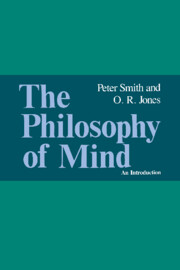Book contents
- Frontmatter
- Contents
- Preface
- Analytical Table of Contents
- PART I Dualism, For and Against
- PART II Towards a Better Theory of the Mind
- VI An Aristotelian Framework
- VII Perception and Sense-Data
- VIII Perception and the Acquisition of Beliefs
- IX Action and Volition
- X Two Theories of Belief
- XI The Function of Beliefs
- XII Functionalism and Folk Psychology
- XIII Assessing the Functionalist Theory
- PART III Sensation, Thought and Freedom
- Chronological Table
- Guide to Further Reading
- Bibliography
- Index
XII - Functionalism and Folk Psychology
Published online by Cambridge University Press: 27 January 2010
- Frontmatter
- Contents
- Preface
- Analytical Table of Contents
- PART I Dualism, For and Against
- PART II Towards a Better Theory of the Mind
- VI An Aristotelian Framework
- VII Perception and Sense-Data
- VIII Perception and the Acquisition of Beliefs
- IX Action and Volition
- X Two Theories of Belief
- XI The Function of Beliefs
- XII Functionalism and Folk Psychology
- XIII Assessing the Functionalist Theory
- PART III Sensation, Thought and Freedom
- Chronological Table
- Guide to Further Reading
- Bibliography
- Index
Summary
In the previous chapter, we sketched the bare bones of a theory of belief which has its origin in the work of Ryle and Armstrong. We need next to put some flesh on the skeleton, for our account of the role played by a particular belief in producing behaviour has so far been doubly schematic. Consider again the given instance of the Mark III theory:
(III) Jack's believing that it is about to rain is a matter of his being in some physical state which is causally responsible for its being true that: if circumstances A were to obtain, Jack would get in the washing; if circumstances B were to obtain, he would take his umbrella; and so on.
One respect in which (III) is merely schematic is in its use of the open-ended formula ‘and so on’. Now, it is easy enough to begin filling out that final clause: we all know the sorts of behaviour which would in various circumstances manifest the belief that it is raining. But what is the basis of this knowledge? How do we know what other ‘iffy’ claims are covered by the use of ‘and so on’?
We will tackle this problem indirectly, by noting that a similar problem is raised by the other respect in which (III) is schematic. For how are we to fill out those phrases ‘circumstances A’, ‘circumstances B’?
- Type
- Chapter
- Information
- The Philosophy of MindAn Introduction, pp. 163 - 176Publisher: Cambridge University PressPrint publication year: 1986



